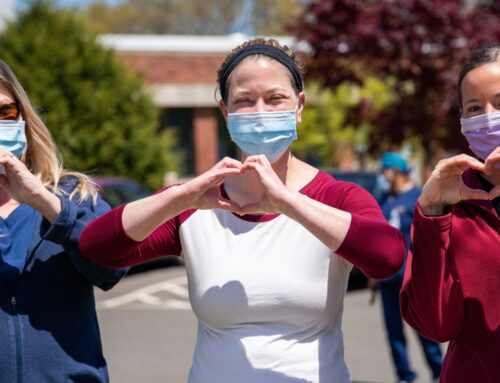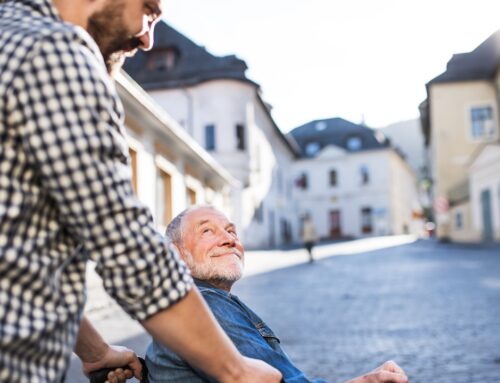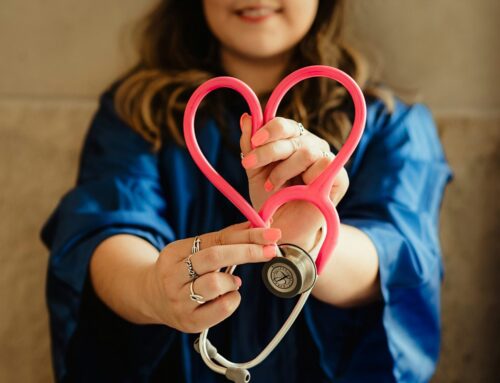Ask Your Therapist if Kindness is Right for You: Kindness and Mental Health
“Helping others is a universal virtue and a very affordable and economic way to benefit others and our own well-being,” -Bryant Hui
by: M.T. Bennett
In 2025 we celebrated the 20th anniversary celebration of one of our sister organizations, the Maliheh Free Clinic, so the intersection of kindness and health has been on my mind. This is the second article in a series on health and kindness and will show how being kind is good for our mind.
Feel free to check out the other articles in this series: “Kindness and Physical Health” and “Kindness in Healthcare Workers“.
Treat Yourself
Students in our kindness classes often tell us that the hardest person to be kind to is themself. They say it is because we can’t hide from or lie to ourselves. We are our own worst critic. In our minds we say things to/about ourselves that we would never allow anyone to say about another person. It is sad how often we hear this because being kind to yourself is vital to your mental well-being, and your ability to be kind to others.
The Golden Rule is, “treat others like you would like to be treated”. Sometimes we need to turn it around and remember to “treat yourself like you would like others to be treated”. If we aren’t kind to ourselves, how can we hope to be kind to others? Thankfully, there is a whole field of research dedicated towards how to be kind to yourself, or self-compassion.
This goes deeper than scheduling a spa day or practicing yoga. Self-compassion includes realizing that you feel pain, seeking to alleviate that pain, accepting our weaknesses while accepting responsibly to improve, and allowing yourself grace and time to do so. It involves acknowledging our common humanity, being kind, and being mindful.
The research on those who are self-compassionate is compelling. An article published in the Oxford Handbook of Compassion says, “Summing up an increasingly large body of research, a consistent finding in the literature is that self-compassion is inversely associated with psychopathology.” Researchers find that those with self-compassion have less self-criticism which is usually high in people in depression and anxiety. People who are kind to themselves report feeling more grateful, more optimistic, and more happy. There is a multitude of great research on the benefits of self-compassion. If you want more than this article has provided you should check out Dr. Kristin Neff’s work.
We cannot draw water from an empty well, so on our journeys to being kinder we cannot forget to be kind to ourselves.
Kind to Others
Now this may sound contradictory after the last section, but when being self-compassionate, we need to avoid becoming self-indulgent. That is a difficult line to walk, and one that every person needs to find for themselves. Sometimes, in our individualistic culture we are told we need to focus on ourself as the answer to happiness. Book stores have a whole section related to “Self-Help” books, but you never seem to find an “Other-Help” book section. This inward focus can be to our detriment if not tempered with a focus on others as well.
In the book “Wonder Drug”, which would belong in the “Helping Others” section of a bookstore, Drs. Trzeciak and Mazzarelli talk about the benefits of service and discuss dangers in self-absorption. They make a bold claim saying, “The truth is, its not all about you. It never has been. And by fixating on ourselves, we can actually harm ourselves. Self-serving culture has trained us to take care of number one and ‘our own’ and screw everyone else. But this attitude has left us feeling alone and empty, and it’s triggered an anxiety epidemic…Research has found that the more people focus solely on themselves, the worse off they may be in almost every metric that can be measured: physical and mental health, emotional well-being, and professional success.” It is a bold claim, but the book certainly backs it up.
Research on everything from an isolated village in Vanuatu, to kids as young as two years old show that being kind to others brings more happiness than just focusing on ourselves. Getting out there and actually doing kind things is key.
For example, one study looked at three groups; one practiced loving-kindness meditation, one focused on doing acts of kindness, and a control. The found that both loving-kindness meditation and acts of kindness were able to reduce depression in individuals who are “low on agreeableness” (scientific language for “grouchy people”). However, the group that reported the most impact was the group that did acts of kindness, not the group that meditated or just thought about kindness.
Doing kind acts for others is vital to helping our health improve. That is why I like this quote from “The Healing Power of Doing Good” where the authors say, “Exercise and good nutrition, for all their power to keep us healthy, are not enough. The next revolution in health care must be to bring to our awareness the health potential of helping others. The present headlined health revolution will not be completed until people realize that no matter how much they concentrate on themselves, they cannot achieve optimum health. They have to relate to others.”
That quote was written in 1991, I would say we are due for that kindness health revolution they are calling for.
Can Money Buy Happiness
In our article on physical health we discuss how spending money on others is good for your heart. However, no matter how counterintuitive it may seem, replicated and verified studies show that people gain more happiness by spending money on others than splurging on themselves. Money can literally buy happiness…if it is spent on helping someone else.
Part of this is because making an impulse purchase on oneself may feel good in the moment, but we often feel buyer’s remorse and regret towards that decision. However, when we spend on someone else, not only do we feel happy then, but research has found that when we reflect on that memory, we feel happy again. By spending money on others, we create a happy moment and a happy memory of having done something good.
So, next time one of your coworkers says they are having a rough day, ask them for $20. Tell them it will make them feel happier.
Making Friends
Another benefit of kindness is that it just makes people want to be around us. Funny enough, research shows that people perceive someone as more attractive if they think they are kind. Some of us need all the help we can get. Kindness connects us to people. As social creatures, this social connection is vital. Some might even say it is lifesaving.
Our society is currently experiencing a Loneliness Epidemic. A report from the U.S. Surgeon general claims that the effect of loneliness is as dangerous as smoking 15 cigarettes a day (I guess along with the anti-drug and anti-smoking programs in schools we should have pro-friendship ones too). Twenty percent of American’s report that they have ZERO close social connections. In men under the age of 30 that number increases to 28% who have no close relationships. We have become isolated and, as social creatures, we were never meant to live this way. It is damaging and dangerous.
Thankfully, kindness can be the answer. In one study researchers wanted to see if they could increase social connections and friendships, reduce distress, and increase life satisfaction in subjects. They divided participants into three groups. Some received Cognitive Behavioral Therapy (CBT), some tried to participate in more social activities (parties, book clubs, social events), and the last group focused on doing acts of kindness. In the end they found that all groups benefited. Therapy is helpful, hanging out with people is helpful, and being kind is helpful. However, they found that, “acts of kindness showed advantages over both cognitive reappraisal and social activities for social connection, which was our primary study outcome. Neither the social activities nor the cognitive reappraisal conditions resulted in significant change in social connection.”
Despite what my mom told me as a shy teenager I didn’t need to be more outgoing to make more friends. Apparently, it’s as easy as just being more kind.
Speaking of friends, what kind of people do you surround yourself with? What kind of influence are you in the groups you are part of? Did you know that just seeing an act of kindness performed by another person can lower our stress levels and help you feel happier, calmer, more grateful, and more generous. So, surround yourself with kind people, watch kind media, be that kind example in the life of others.
Kindness and the Brain
Now, lets get into the nitty gritty of what kindness does to us on a neurotransmitter level.
Cortisol
Cortisol is a hormone produced by adrenal glands in response to a stress stimulus. As discussed in our article on kindness and physical health our bodies stress response is normal…in moderation. When we become overly stressed for weeks, months, years we start to develop adverse effects. Chronically high levels of cortisol can lead to weight gain, bone density loss, memory impairment, and more.
The good news is that kindness is a natural stress reducer. Research shows that as we are kind, as we build connections, engage in meaningful pro-social behaviors, get out of our own problems by helping others with theirs we develop greater resilience and lower our stress levels. So, in our stressful modern world, take a moment every day, and turn off your stress response by being kind.
Positive Neurotransmitters
Let’s discuss three big neurotransmitters. First, my favorite, serotonin which has a myriad of effects. It is famously known for regulating anxiety, mood stabilization, and helping against depression. A little known fact about serotonin is that about 90% of serotonin is made in your gut and influences bowel motility, bladder control, and even platelet aggregation to help blood clot and stop bleeding. It is a versatile and important chemical in our bodies.
While there are a lot of good interventions to increase serotonin in our bodies one interesting method is a focus on kindness. One study compared Dialectical Behavioral Therapy (DBT) and Compassion-Focused Therapy (CFT), which is based on self-compassion, making human connections, and mindfulness. They found that while both DBT and CFT lowered cortisol and raised serotonin, “CFT showed more significant effects on the blood cortisol and serotonin levels, compared to DBT.”
Another important neurotransmitter is dopamine which activates feelings of pleasure, reward, and satisfaction. It has been closely linked to addiction when illicit drugs hijack this system. However, kindness is the safest drug you could ever take to activate your dopamine. It is also completely legal. Along with dopamine is oxytocin, colloquially called the “love hormone”. It helps lower blood pressure, reduces stress, but is especially important in the creation of social bonds. When a mother sees her newborn child that closeness triggers the release of oxytocin which is vital to initiating a lot of post-partum processes.
Acts of altruism and compassion have been linked to increased dopamine and oxytocin. It is hypothesized that the release of these hormones in response to alleviating the suffering of others is part of our evolutionary development as a social species. By being kind, we get a boost of feel-good hormones, which reinforces our kind behaviors.
Intranasal administration of oxytocin in monogamous titi monkeys has been linked to prosocial behaviors and researchers hypothesize that “humans could have similar long-term effects”. This connects beautifully with the quote by Eric Hoffer, “Kindness can become its own motive. We are made kind by being kind.” Through kind actions we stimulate the release of oxytocin, which then promotes prosocial kind behaviors, stimulating more oxytocin, and on and on in an upward spiral of kindness.
Conclusion: Kindness Is the Mind’s Medicine
From reducing stress hormones, boosting positive neurotransmitters, deepening social bonds, to lifting depression, the evidence supporting kindness is clear. It isn’t just a virtue; it is a vital part of mental health. Whether directed inward through self-compassion or outward through acts of service, kindness heals. It combats loneliness, reshapes our inner dialogue, and even changes our brain chemistry for the better. Kindness isn’t just a nice thing to do. It is a necessary practice for a healthier mind and a more connected world. So, be kind for your mind.
References
Abbas Ghodrati Torbati, Ali Akbar Samari, Hoseyn Akbari Amarghan, Nejat, H., & Hasan Toozandehjani. (2021). Comparison of the Effectiveness of Dialectical Behavior Therapy and CompassionFocused Therapy on Blood Cortisol and Serotonin Levels in Drug Abusers. Razavi International Journal of Medicine, 9(1), 14–20. https://doi.org/10.30483/rijm.2021.249763.0
Aknin, L. B., Broesch, T., Hamlin, J. K., & Van de Vondervoort, J. W. (2015). Prosocial behavior leads to happiness in a small-scale rural society. Journal of Experimental Psychology: General, 144(4), 788–795. https://doi.org/10.1037/xge0000082
Aknin, L. B., Dunn, E. W., & Norton, M. I. (2011). Happiness Runs in a Circular Motion: Evidence for a Positive Feedback Loop between Prosocial Spending and Happiness. Journal of Happiness Studies, 13(2), 347–355. https://doi.org/10.1007/s10902-011-9267-5
Appleton, J. (2018). The Gut-Brain Axis: Influence of Microbiota on Mood and Mental Health. Integrative Medicine: A Clinician’s Journal, 17(4), 28. https://pmc.ncbi.nlm.nih.gov/articles/PMC6469458/
Arnocky, S., Piché, T., Albert, G., Ouellette, D., & Barclay, P. (2016). Altruism predicts mating success in humans. British Journal of Psychology, 108(2), 416–435. https://doi.org/10.1111/bjop.12208
Bennett, M. T. (2025, May 12). Ask Your Doctor if Kindness is Right for You: Kindness and Physical Health. The Power of Kind. https://thepowerofkind.org/ask-your-doctor-if-kindness-is-right-for-you-kindness-and-physical-health/
Berger, M., Gray, J. A., & Roth, B. L. (2009). The expanded biology of serotonin. Annual Review of Medicine, 60(1), 355–366. https://doi.org/10.1146/annurev.med.60.042307.110802
Blatt, S. J. (1995). The destructiveness of perfectionism: Implications for the treatment of depression. American Psychologist, 50(12), 1003–1020. https://doi.org/10.1037/0003-066x.50.12.1003
Cleveland Clinic. (2021, October 12). Cortisol: What It Is, Function, Symptoms & Levels. Cleveland Clinic. https://my.clevelandclinic.org/health/articles/22187-cortisol
Cox, D., Streeter, R., Abrams, S., & Clemence, J. (2020, September 30). Socially distant: How our divided social networks explain our politics. The Survey Center on American Life. https://www.americansurveycenter.org/research/socially-distant-how-our-divided-social-networks-explain-our-politics/
Cregg, D. R., & Cheavens, J. S. (2022). Healing through helping: an experimental investigation of kindness, social activities, and reappraisal as well-being interventions. The Journal of Positive Psychology, 18(6), 1–18. https://doi.org/10.1080/17439760.2022.2154695
Dunn, E. W., Aknin, L. B., & Norton, M. I. (2008). Spending Money on Others Promotes Happiness. Science, 319(5870), 1687–1688. https://doi.org/10.1126/science.1150952
Esch, T., & Stefano, G. B. (2011). The neurobiological link between compassion and love. Medical Science Monitor, 17(3), RA65–RA75. https://doi.org/10.12659/msm.881441
Fryburg, D. A. (2021). Kindness as a Stress Reduction–Health Promotion Intervention: A Review of the Psychobiology of Caring. American Journal of Lifestyle Medicine, 16(1), 155982762098826. https://doi.org/10.1177/1559827620988268
Hannibal, K. E., & Bishop, M. D. (2014). Chronic Stress, Cortisol Dysfunction, and Pain: a Psychoneuroendocrine Rationale for Stress Management in Pain Rehabilitation. Physical Therapy, 94(12), 1816–1825. https://doi.org/10.2522/ptj.20130597
Health Direct. (2023, August). Dopamine. Healthdirect.gov.au; Healthdirect Australia. https://www.healthdirect.gov.au/dopamine
Lee, H.-J., Macbeth, A. H., Pagani, J., & Young, W. S. (2009). Oxytocin: The Great Facilitator of Life. Progress in Neurobiology, 88(2). https://doi.org/10.1016/j.pneurobio.2009.04.001
Luks, A., & Payne, P. (2001). The healing power of doing good : the health and spiritual benefits of helping others. Iuniverse.com.
Male and Female Titi Monkeys Exhibit Different Biological and Behavioral Responses to Intranasal Oxytocin. (2023, January 24). Cnprc. https://cnprc.ucdavis.edu/blog/male-and-female-titi-monkeys-exhibit-different-biological-and-behavioral-responses-intranasal
Mongrain, M., Barnes, C., Barnhart, R., & Zalan, L. B. (2018). Acts of kindness reduce depression in individuals low on agreeableness. Translational Issues in Psychological Science, 4(3), 323–334. https://doi.org/10.1037/tps0000168
Murthy, V. (2023). Our Epidemic of Loneliness and Isolation: The U.S. Surgeon General’s Advisory on the Healing Effects of Social Connection and Community. Public Health Service. https://www.hhs.gov/sites/default/files/surgeon-general-social-connection-advisory.pdf
Neff, K. (2003). Self-compassion: An alternative conceptualization of a healthy attitude toward oneself. Self and Identity, 2(2), 85–101. https://doi.org/10.1080/15298860309032
Neff, K. (2015). Self-Compassion. Self-Compassion. https://self-compassion.org/
Neff, K. D., & Germer, C. (2017). Self-Compassion and Psychological Wellbeing. In E. Simon-Thomas, S. Brown, M. Worline, C. D. Cameron, & J. Doty (Eds.), The Oxford Handbook of Compassion Science. Oxford University Press.
Razo, R. A., Velasco Vazquez, M. de L., Turcanu, P., Legrand, M., Floch, M., Weinstein, T. A. R., Goetze, L. R., Freeman, S. M., Baxter, A., Witczak, L. R., Sahagún, E., Berger, T., Jacob, S., Lawrence, R. H., Rothwell, E. S., Savidge, L. E., Solomon, M., Mendoza, S. P., & Bales, K. L. (2022). Long term effects of chronic intranasal oxytocin on adult pair bonding behavior and brain glucose uptake in titi monkeys (Plecturocebus cupreus). Hormones and Behavior, 140, 105126. https://doi.org/10.1016/j.yhbeh.2022.105126
Rowland, L., & Curry, O. S. (2018). A range of kindness activities boost happiness. The Journal of Social Psychology, 159(3), 340–343. https://doi.org/10.1080/00224545.2018.1469461
Trzeciak, S., & Mazzarelli, A. (2022). Wonder Drug. St. Martin’s Essentials.







